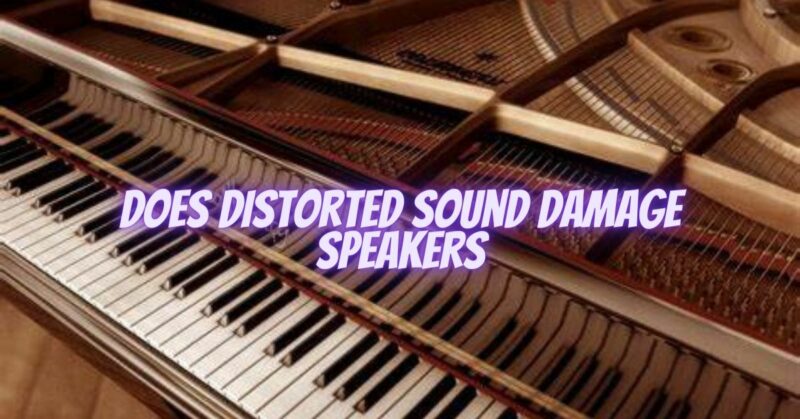Distorted sound can be a source of frustration for audio enthusiasts and can raise concerns about potential damage to speakers. While speakers are designed to withstand normal usage, prolonged exposure to distorted sound can have implications for their performance and longevity. In this article, we will explore the potential risks of distorted sound on speakers and provide insights into mitigating any potential damage.
- Overheating and Voice Coil Damage:
Distorted sound, particularly when accompanied by excessive volume levels, can cause speakers to overheat. When driven beyond their recommended power limits, speakers may experience increased current flow through their voice coils. This can lead to voice coil overheating and, in severe cases, permanent damage to the coil or insulation materials.
- Cone and Surround Damage:
Distorted sound with excessive low-frequency content or sharp transients can cause physical stress on the speaker cone and surround. Over time, this stress can result in wear and tear, leading to cone deformation, surround deterioration, or even tears. These damages can compromise the speaker’s ability to accurately reproduce sound.
- Tweeter Damage:
High-frequency distortion can be particularly damaging to tweeters, the smaller drivers responsible for reproducing high-frequency sounds. Distorted high-frequency signals can cause excessive vibrations and excursion, potentially leading to diaphragm damage, voice coil misalignment, or dome deformation. These issues can significantly impact the tweeter’s performance and result in diminished high-frequency response.
- Speaker Suspension Loss:
Excessive distortion, especially in the low-frequency range, can cause the speaker suspension (spider and surround) to lose its elasticity and become less compliant. This loss of suspension flexibility can alter the speaker’s ability to accurately move in response to audio signals, leading to compromised bass response and overall sound quality.
Mitigating Potential Damage:
- Appropriate Amplification: Use amplifiers that match the specifications and power requirements of your speakers. Avoid overdriving the speakers or operating them at continuous high volume levels to minimize the risk of overheating and damage.
- Speaker Placement and Enclosures: Proper speaker placement and the use of appropriate enclosures can help reduce distortion caused by reflections, resonances, or interference. Ensure that the speakers are positioned correctly, away from walls or other surfaces that may affect their performance.
- Quality Audio Sources: Use high-quality audio sources and avoid low-bitrate or poorly encoded files, as they can introduce distortion. Opt for lossless or high-quality audio formats to maintain accurate signal reproduction.
- Monitoring and Regular Maintenance: Monitor the audio system for signs of distortion, such as audible artifacts or unusual behavior from the speakers. Conduct regular maintenance and inspections to address any potential issues promptly.
- Avoid Prolonged Exposure to Distorted Sound: Minimize prolonged exposure to distorted sound by addressing the underlying causes and maintaining appropriate volume levels. Continual exposure to distorted audio can increase the risk of speaker damage over time.
Conclusion:
While speakers are built to handle normal audio signals, prolonged exposure to distorted sound can pose risks to their performance and longevity. Overheating, voice coil damage, cone and surround wear, tweeter issues, and suspension loss are potential consequences of prolonged distortion. By practicing appropriate amplification, speaker placement, and maintenance, as well as using quality audio sources, you can mitigate the risks and preserve the integrity of your speakers. Maintaining optimal audio quality not only ensures accurate sound reproduction but also helps safeguard your speakers for long-term enjoyment.


